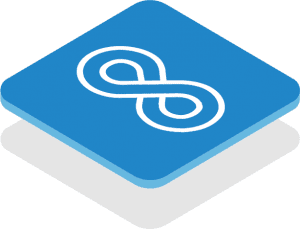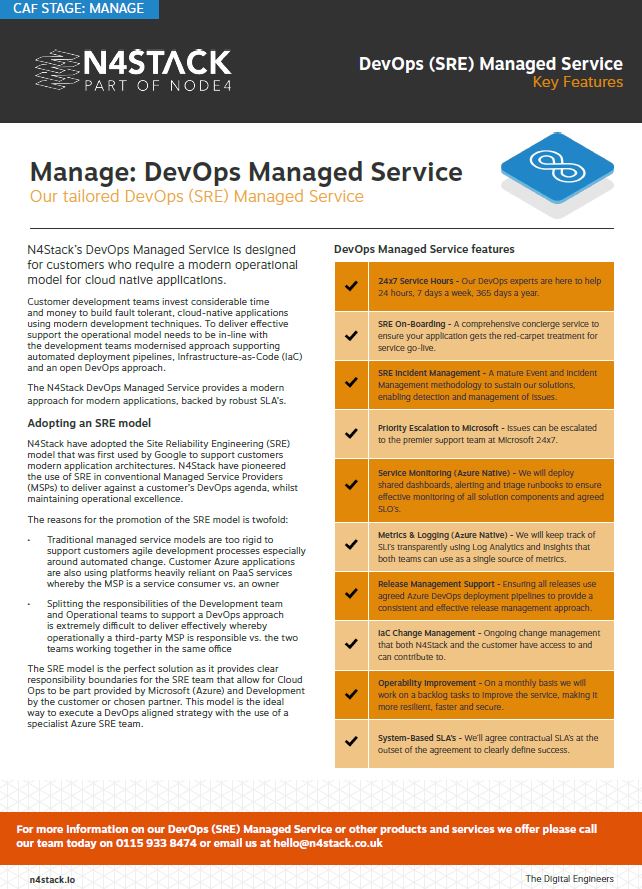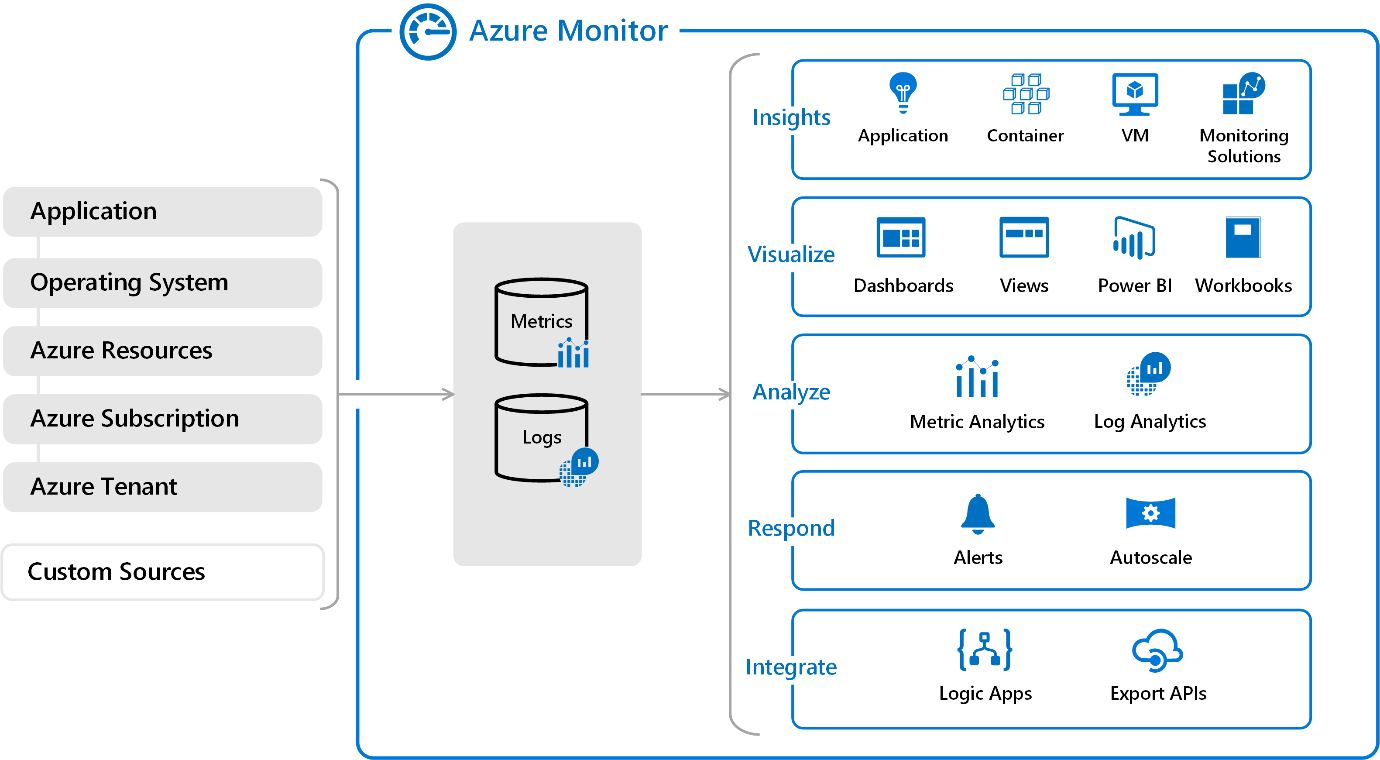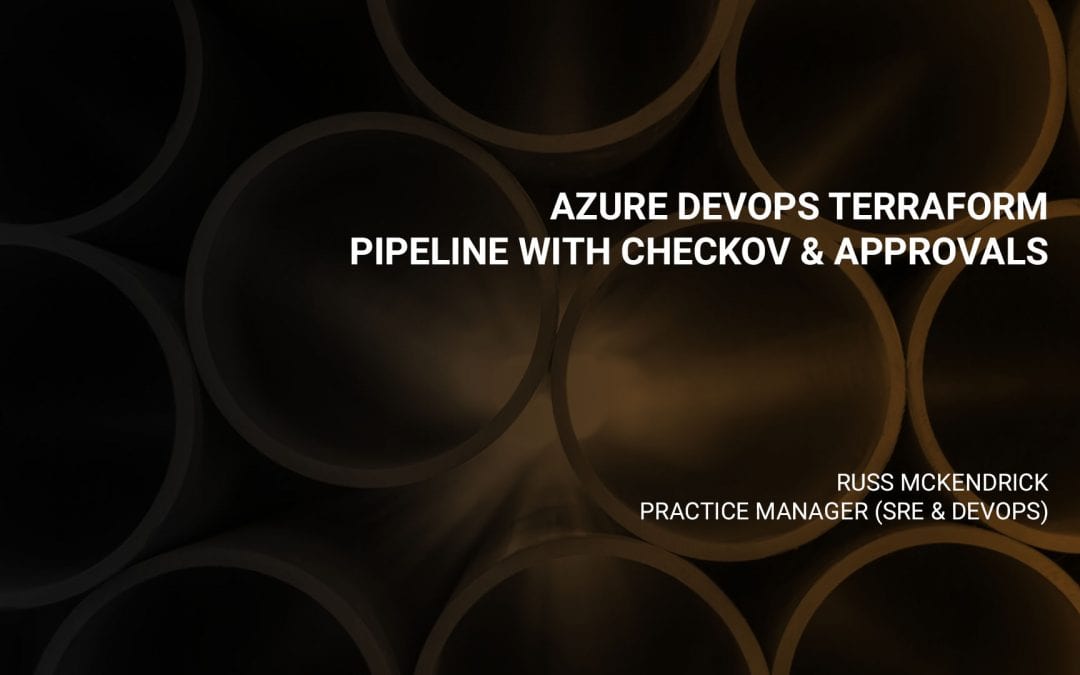DevOps (SRE) Managed Service
Our DevOps Managed Services are designed for customers who require a modern operational model for cloud native applications.

A best-practice approach to DevOps
Customer development teams invest considerable time and money to build fault tolerant, cloud-native applications using modern development techniques. To deliver effective support the operational model needs to be in-line with the development teams modernised approach supporting automated deployment pipelines, Infrastructure-as-Code (IaC) and an open DevOps approach.
The N4Stack DevOps Managed Service provides a modern approach for modern applications, backed by robust SLA’s.

Now available to buy direct from Azure Marketplace

Download our datasheet for more information
What’s included?
Our DevOps (SRE) Managed Service includes the following features:
24x7 Support
Our DevOps experts are here to help 24 hours, 7 days a week, 365 days a year
SRE On-Boarding
A comprehensive concierge service to ensure your application gets the red-carpet treatment for service go-live
Operability Improvement
On a monthly basis we will work on backlog tasks to improve the service, making it more resilient, faster and secure
Priority Escalation to Microsoft
Issues can be escalated to the premier support team at Microsoft 24×7
System-Based SLA's
We’ll agree contractual SLA’s at the outset of the agreement to clearly define success
Metrics & Logging (Azure Native)
We will keep track of Service Level Indicators (SLI’s) transparently using Log Analytics and Insights that both teams can use as a single source of metrics
Release Management Support
Ensuring all releases use agreed Azure DevOps deployment pipelines to provide a consistent and effective release management approach
SRE Incident Management
A mature Event and Incident Management methodology to sustain our solutions, enabling detection and management of issues
Infrastructure-as-Code Change Management
Ongoing change management that both the N4Stack team and the customer have access to and can contribute to on a regular basis
Service Monitoring (Azure Native)
We will deploy shared dashboards, alerting and triage runbooks to ensure effective monitoring of all solution components and agreed SLO’s
SRE Operability Benchmark
N4Stack operates an SRE Operability Benchmark – a set of minimum requirements that the system needs to achieve for the SRE team to accept solution-level operational responsibility.

System Availability SLA must be backed by a compound SLA from Microsoft of ≥ 99.9%

All release management should be automated and utilise Azure DevOps

System must demonstrate adherence to service level objectives during on-boarding
Incident Management
N4Stack has a history of Incident Management excellence. It’s a fundamental skill that is invaluable in terms of operating an effective SRE approach.
The core SRE squad takes Incident Management responsibility for any solution issues but has 24×7 access to 3rd line specialists in-line with the system technologies to augment the support process. The additional N4Stack expertise around Data, Security, and Networking will help reduce resolution times and the team also have a nominated escalation manager at Microsoft for Azure service issues.
We operate a mature Event and Incident Management methodology to sustain our solutions, enabling detection and management of issues. All service Incident lifecycle information can be viewed and tracked via our ServiceNow portal.
Service Monitoring
The DevOps Managed Service leverages the embedded capability of the Azure Monitor services that will be deployed during on-boarding. Azure Monitor provides a highly resilient PaaS deployment that natively integrates with all Azure Services.
The SRE team will work with you to deploy shared dashboards, alerting and triage runbooks to ensure the effective monitoring of all solution components.

Release Management
A key part of the DevOps Managed Service is the desire to remove the need to undertake manual changes to the service configuration outside of agreed releases. Therefore, all changes are made via the configuration files and pushed through an agreed deployment pipeline with agreed automated testing.
N4Stack will work with you to ensure there is a consistent and effective release management approach in place.
Development Tool Chain
Customers may use a range of tools as part of their deployment process, however the SRE Service mandates the use of Azure DevOps to define and manage the deployment process. Typically, the SRE team will use a mixture of Terraform, Ansible and ARM templates to support the infrastructure side and customers commonly also integrate tools such as Jenkins and Octopus. In addition, Azure DevOps provides a shared space to collaborate and accommodate shared working on releases.
The release process will depend on the application and customer requirements; however, we encourage customers to consider lower risk strategies such as blue/green and/or canary deployments.
Infrastructure-as-Code (IaC)
To support the effective operation of the SRE service all infrastructure needs to be defined as code and all configuration changes should flow through the deployment pipeline.
The N4Stack DevOps team will lead on the management and definition of the IaC scripts however, via the release management process you will be able to make configuration changes and contribute in-life.
Operability Improvement
Operability of the system must be treated as a first-class priority and a shared responsibility between the SRE and customer development teams.
Operability Improvement will be focused on improving the following areas at both the Application and Infrastructure levels.
Availability
Performance
Scalability
Security
Recoverability
Business Continuity
Deployment
Monitoring
Logging & Metrics
N4Stack will undertake a review session with you on a monthly basis to review the backlog, and help with task sizing and prioritisation. During each given month you will have a number of hours “Operability Improvement Time” whereby during the month we will work on the highest prioritised task and allocate the time to working through the backlog.







